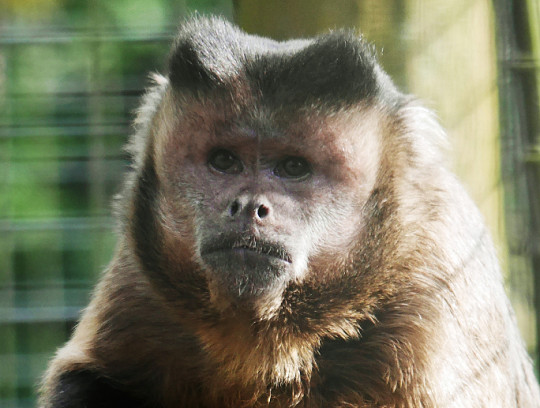
Name: Banjo
Species: Black-capped Capuchin (Sapajus apella)
Who is he? The Brave Alpha
Special skills: Always being at the front row at feeding times
Adopt Banjo
Adopting
Adopting a monkey with Wild Futures really is a gift with a difference. Whether it’s a gift for yourself or another, you will be supporting the vital work of our charity and enabling us to protect primates and their habitats worldwide. The monkeys featured in the symbolic adoption scheme reside at Wild Futures’ The Monkey Sanctuary in Cornwall, UK, where they all have a home for life. Adopters become part of a proud, extended family of supporters who are a part of each individual’s lives through visits, updates and photos. We are committed to giving the monkeys we have rescued the most natural life possible, amongst company of their own kind in species specific territories. The generous contributions from adopters help us to help them recover from the mental and physical trauma they have suffered in their former lives as someone’s pet, and simply learn how to just be a monkey. Each monkey is unique with their own stories and personalities, so please do spend some time reading through their profiles.
International adoption packs will be sent digitally, direct to your inbox. If you would like a physical pack, please email [email protected] to discuss options.
As an adopter, you will receive:
- A personalised certificate of your adoption
- A photo of your adopted monkey
- Your adopted monkey’s story
- Species factsheet
- Wild Futures newsletters twice a year (sent digitally or physically)
- Discounted entry fee into The Monkey Sanctuary
- A cuddly monkey toy (optional and for physical packs only)
About Banjo
Name: Banjo
Species: Black-capped Capuchin (Sapajus apella)
Who is he? The Brave Alpha
Special skills: Always being at the front row at feeding times
Banjo is a member of the Sanctuary’s only natural family group of capuchins, who arrived in March 2012. The group were living at an animal care college in the UK, but by 2012, it had become apparent to the college that capuchin monkeys, as they are wild animals, are unsuitable for students to gain hands-on animal care experience with. So Wild Futures’ Monkey Sanctuary was asked to rehome them all. Banjo was born at the college on 23rd March 2009 - the first of four youngsters.
Upon his arrival, Banjo paid a visit
to the Sanctuary’s veterinary for a routine health check - and to have a
vasectomy. The Sanctuary has a non-breeding policy as we do not believe that primates should be bred to spend their lives in captivity and, at three years of
age, Banjo was old enough to have the procedure at the same time as his vet check - something that saved him an extra vet trip in the future.
Banjo inherited his high ranking position, and he is a naturally confident male who has always showed a great interest in group politics. As he has matured, Elvis allowed him greater control within the family group - and Banjo is thriving!
Ever helpful, when the carers are trying to clear enclosures to enable the daily cleaning routine to take place, Banjo is usually seen shuffling unwilling members of his group out of the areas to be emptied.
Adopting Banjo means that you are helping to provide the resources needed to give Banjo the best life possible. Your adoption also enables Wild Futures to continue its vital work campaigning for an end to the primate pet trade in the UK and abroad.
IMPORTANT INFORMATION:
Our adoptions are purely symbolic, which means you will not receive any real animals in the post! Monkeys are wild animals – not domesticated pets.
The need for rescue and rehabilitation of primates from private ownership:
- There are at least 5,000 privately owned primates in the UK
- All monkeys are wild animals and inherently unsuitable for keeping in domestic situations.
- UK law allows for the legal keeping of primates as pets, despite lack of recognised care standards and insufficient enforcement of licensing laws, leading to many pet primates being kept in inadequate conditions.
- Lack of adequate species knowledge, diet, veterinary care, social opportunity and space leads to mental, physical and emotional suffering for pet primates.
How our sanctuary meets their needs:
- We guarantee a home for life for all rescued monkeys.
- We give individuals the opportunity to socialise and form natural bonds with other monkeys.
- We provide an expert team of carers with the relevant skills to meet the complex physical, social and emotional needs of each individual.
- We have a high carer-to-monkey ratio which ensures that all needs are met, 24 hours a day, 365 days a year.
Our charity receives no government funding, so financial support is vital to allow us to continue our important work.
By purchasing a symbolic monkey adoption, you are agreeing to our Terms and Conditions.

